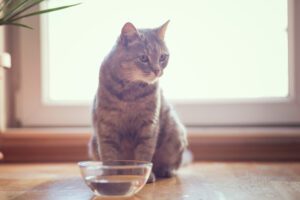Is My Cat Dehydrated? 5 Signs to Look For
Dehydration in cats is a common concern that can lead to serious health complications if left unattended. In this blog post, we’ll outline 5 key signs of dehydration to keep an eye out for in your feline. If you observe any of these symptoms, don’t hesitate to reach out to Lagniappe Animal Health at (318) 255-3303 or schedule an appointment with our expert veterinarians. Remember, it’s always best to seek professional advice when it comes to your pet’s health.

Understanding Dehydration in Cats
Dehydration can occur when your cat loses more fluids than they take in. This can be caused by various factors such as illness, excessive diarrhea and/or vomiting, excessive heat, or insufficient water intake. Without proper hydration, your cat’s body will not be able to function correctly, and this can lead to a cascade of potential health risks.
5 Signs Your Cat May Be Dehydrated
Cats can be masters of hiding discomfort, so it’s essential to be observant.
Here are five signs of cat dehydration to watch out for:
1. Dry, Sticky Gums
Check your cat’s gums–the condition of the gums is a strong indicator of your cat’s hydration levels. Healthy gums should be wet and slick. If they feel dry or sticky to the touch, it might be a sign of dehydration.
2. Sunken Eyes
Another sign to look for is sunken eyes. A dehydrated cat’s eyes may appear dull and sunken, rather than bright and alert. This could be indicative of a serious underlying condition.
3. Reduced Elasticity of the Skin
You can also check for dehydration by gently pinching your cat’s skin between your thumb and forefinger. In a hydrated cat, the skin will quickly drop back to its normal position. If the skin remains tented or smooths down slowly, it may be a sign of dehydration.
4. Decreased Energy Levels and Appetite
A noticeable change in your cat’s energy levels and appetite might also be indicative of dehydration. If your cat seems lethargic or has a reduced interest in food, it’s time to consult with a veterinarian.
5. Increased Urination or Constipation
Changes in your cat’s urinary habits, such as increased urination or constipation, could be symptoms of dehydration. Try to monitor your pet’s litter box behavior, as this can better help you understand your cat’s overall health and condition.
Treatment Options for Dehydrated Cats
If you suspect your cat is dehydrated, it’s time to take prompt action. Here are some treatment options your cat may need to improve their condition and restore their health:
Hydration Fluids
Your veterinarian might need to administer fluids under the skin (subcutaneously) or intravenously to rehydrate your cat. This is often the most effective and rapid way to address dehydration.
Oral Rehydration
In some cases, your vet may recommend giving your cat an electrolyte solution by mouth to encourage them to drink more and replenish lost fluids. Another recommendation may include feeding your cat a wet food diet or adding water to their dry food.
Address the Underlying Cause
Identifying and treating the underlying cause of dehydration, such as an illness or kidney issue, can also be vital in preventing recurrence.
Monitoring and Home Care
After initial treatment for dehydration, your vet will likely advise you to monitor your cat’s condition at home, ensuring they continue to drink and eat adequately.
How Lagniappe Animal Health Can Help
Dehydration in cats is a serious concern, but by knowing what signs to look for, you can take quick action to get the necessary care. Always trust your instincts as a pet owner and consult a professional veterinarian if something doesn’t seem right. Lagniappe Animal Health is here to assist you, providing top-notch care for your beloved feline friend in Ruston, LA. Call us at (318) 255-3303 if you have further questions or need to make an appointment.

